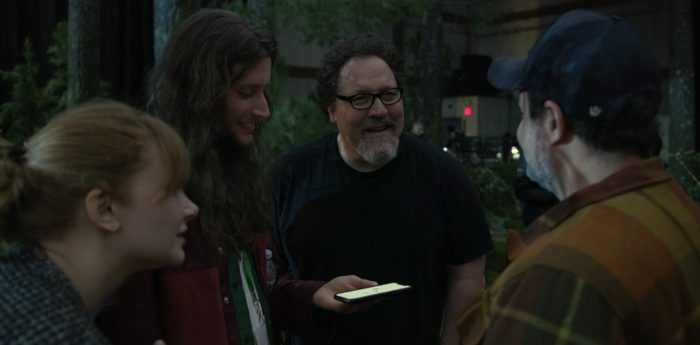Since The Mandalorian is a Star Wars spin-off, executive producers Jon Favreau and Dave Filoni wanted a score that felt familiar to fans who grew up on with the iconic themes of John Williams, but also veered into new territory to distinguish itself from the rest of the Star Wars universe. They were hoping for something that was influenced by the work of The Good, the Bad and the Ugly composer Ennio Morricone and the various scores from the films of Akira Kurosawa, a filmmaker who had a big influence on George Lucas. They got exactly what they wanted from Oscar-winning Black Panther composer Ludwig Göransson, and the first time they heard it was on set from his phone.
The documentary series Disney Gallery: The Mandalorian continues today by shining a light on the mix of techno industrial sounds and orchestral magic that make up Ludwig Göransson’s score for the series. This episode has some mesmerizing footage of Göransson playing with his instruments and recreating the pieces of music that make up the theme to The Mandalorian. That deep, haunting whistle from the beginning of the theme? That’s a big bass recorder.
When he began his work on the Mandalorian score, Göransson created five pieces of music, each roughly five minutes long, with various themes that represented different characters or planets. He worked on that music for a month, and then he paid a visit to the studio where The Mandalorian was filming and, from his phone, played the theme that begins with the haunting bass recorder notes that fans are so familiar with now.
Jon Favreau and Dave Filoni listened intently, while director Bryce Dallas Howard watched the two executive producers for their reaction to the music. Favreau and Filoni were immediately smitten by the music, proclaiming that it didn’t sound like anything they’d heard before. Favreau even takes the phone right over to the documentary crew’s boom mic and excitedly plays it for them to hear for the first time. He points at Göransson and says, “On a recorder. In his bathtub,” and the composer adds, “In the woods.” And that’s just a small sampling of the unique things that Göransson does in order to give his music a signature sound.

Ludwig Göransson‘s Literal Wall of Sound
There’s another sequence in this episode of Disney Gallery: The Mandalorian where Ludwig Göransson is standing in front of this concave wall of switches, knobs, controls, lights and a handful of wires connected from one audio jack to another. This is where Göransson creates the techno industrial sounds that you hear in the score that don’t sound like traditional orchestral instruments.
From here, he creates electronic beats, technological tapping, computerized hums, and so much more, all by plugging in and unplugging little audio cords, turning knobs, and generally just playing around. It’s a literal wall of sound, and you can hear how it’s utilized in the track “Little Mousey” from Chapter Six of The Mandaorian, “The Prisoner.”
Ludwig Göransson was already quickly becoming one of my favorite new composers, and now that I’ve seen how he works, I’m even more impressed with his unique musical perspective. No one is making musical that sounds like this, and that’s probably why he composed no less than five scores for films in 2018 (Black Panther, Death Wish, Slice, Venom and Creed II), as well as doing the score for every single episode of The Mandalorian‘s first season, as well as Angie Tribeca and New Girl. Plus, he’s the one tasked with providing the score for Christopher Nolan’s Tenet, so get ready for that.
The post Jon Favreau & Dave Filoni First Heard ‘The Mandalorian’ Theme on Composer Ludwig Göransson’s Phone appeared first on /Film.

